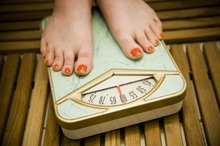What Are the Benefits of Healthy School Lunches?
As part of the Healthy, Hunger-Free Kids Act established in 2010, the National School Lunch Program's policies were revised to better guarantee that children receive a nutritionally sound lunch. The changes ensure that schools offer fruits and vegetables, whole-grain foods, low-fat dairy products and limit calories, saturated fat and sodium. As a parent, you can follow these same guidelines if you pack your child’s lunch and track the nutritional value on a calorie counter app. A healthy school lunch provides sound nutrition to establish a lifetime of healthy habits and the energy your child needs for the rest of her busy day.
Provides Key Nutrients
It’s vital your child eats a healthy lunch, because lunch provides one-third of his daily calories. You want to make those calories count by offering nutrient-dense foods. Children who eat a healthy lunch have a higher nutrient intake not only for lunch but also for the entire day -- compared to children who don’t -- according to the website, Fuel Up to Play 60. If your child’s school gets federally reimbursed for school lunches, rest assured that his lunch is providing him with one-third of his daily needs for protein, vitamins A and C, iron and calcium, which are critical nutrients often lacking from a child’s diet.
Limits Fat Intake
The Advantages & Disadvantages of School Canteens
Learn More
The American Heart Association recommends children get no more than 25 to 35 percent of their calories from fat, with most fat coming from polyunsaturated and monounsaturated fats. Think nuts, fish and vegetable oils as opposed to pizza, cake and cookies. This is enough to support normal growth and development, and to meet your child's energy needs while supporting sound heart health -- for now and the future. A healthy school lunch limits fat to less than 30 percent and saturated fat to less than 10 percent of overall calories over the course of a week.
Prevents Obesity
Dr. Dan Taber, an investigator for the research program, Bridging the Gap, told the Robert Wood Johnson Foundation that providing children with healthy foods at school is a key step in decreasing childhood obesity rates. School menus or foods from home that are high in saturated fat can lead to obesity and associated health conditions, which include diabetes and high blood pressure. Healthy options, such as high-fiber foods, whole-grains, fruits, vegetables, legumes and low-fat dairy products, will fill up your child and keep him full longer. This can prevent unwanted weight gain and chronic health conditions.
Boosts Energy and Grades
What Are the Benefits of Children Eating Snacks During School?
Learn More
When children don’t eat a healthy lunch, it’s harder for them to concentrate at school and to muster the energy for after school activities. They’re also more likely to reach for unhealthy snacks later in the afternoon. By offering a healthy school lunch, your child will get the energy he needs to power through the afternoon. A study published in 2008 in the “Journal of School Health” examined the eating habits of nearly 5,000 school children. Children who ate more fruits, vegetables and protein and fewer calories from fat, performed better on literacy tests compared to children with a high-fat, high-salt diet.
Related Articles
References
Writer Bio
Michelle Fisk began writing professionally in 2011. She has been published in the "Physician and Sports Medicine Journal." Her expertise lies in the fields of exercise physiology and nutrition. Fisk holds a Master of Science in kinesiology from Marywood University.









